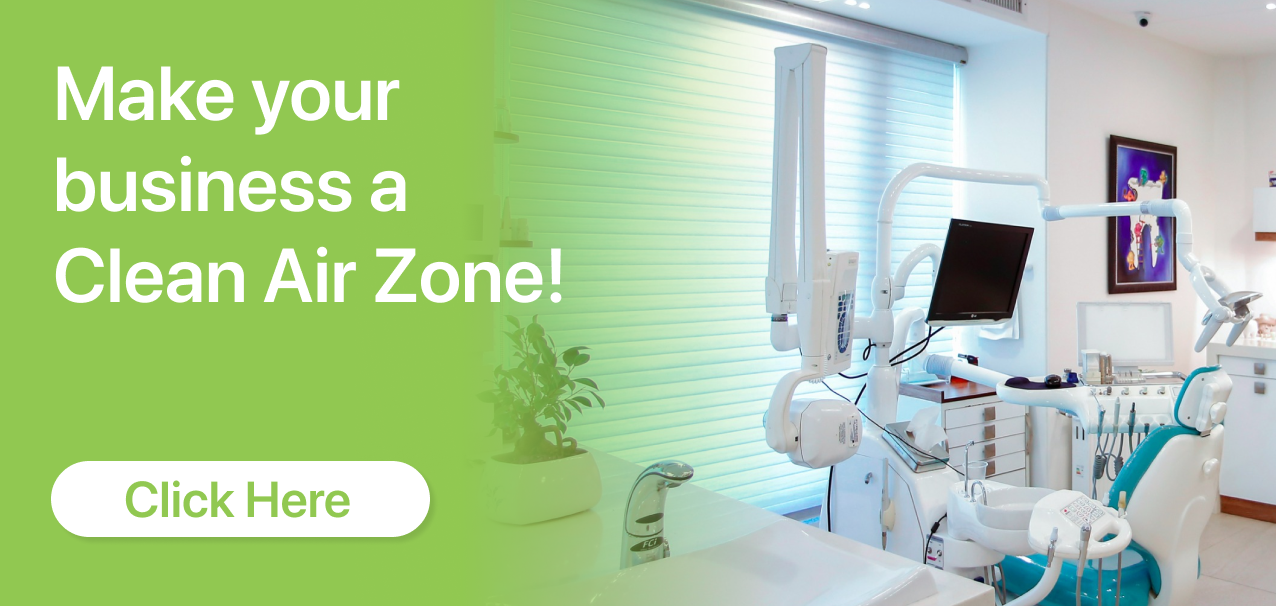LEARN / ARTICLE
Neuro Care by Klinik Pintar Achieves a 97.5% Indoor Air Quality Improvement After Becoming a CAZ
CAZ Stories presents a series of articles shedding light on the transformative effects of Clean Air Zones in diagnosing and remedying indoor air quality challenges for businesses across Indonesia. To explore more, delve into our previous CAZ Stories:
- AC Ventures
- Mighty Minds Preschool
- Global Shipping Company
- Mazars Indonesia
- IShine Kelapa Gading
- YCAB Foundation
- New Zealand School
- Kinderfun Preschool
- HEI Schools
- Green Montessori School
Air pollution remains a pressing issue affecting everyone globally, with Indonesia being no exception. Cities with elevated pollution levels, like Jakarta, witnessed an alarming average pollution level of 38 µg/m3 in 2023. This situation raises concerns for residents, given that the current pollution levels significantly surpass the National Ambient Air Quality Standard (NAAQS) of 15 µg/m3 annually. Notably, this figure is nearly 8 times higher than the WHO annual guideline.
WHO has identified PM2.5 as a hazardous pollutant, primarily due to its minuscule size, enabling easy entry into the lungs upon inhalation. While PM2.5 poses a threat to the general population, the risks escalate for vulnerable groups, including children under five and adults over sixty.
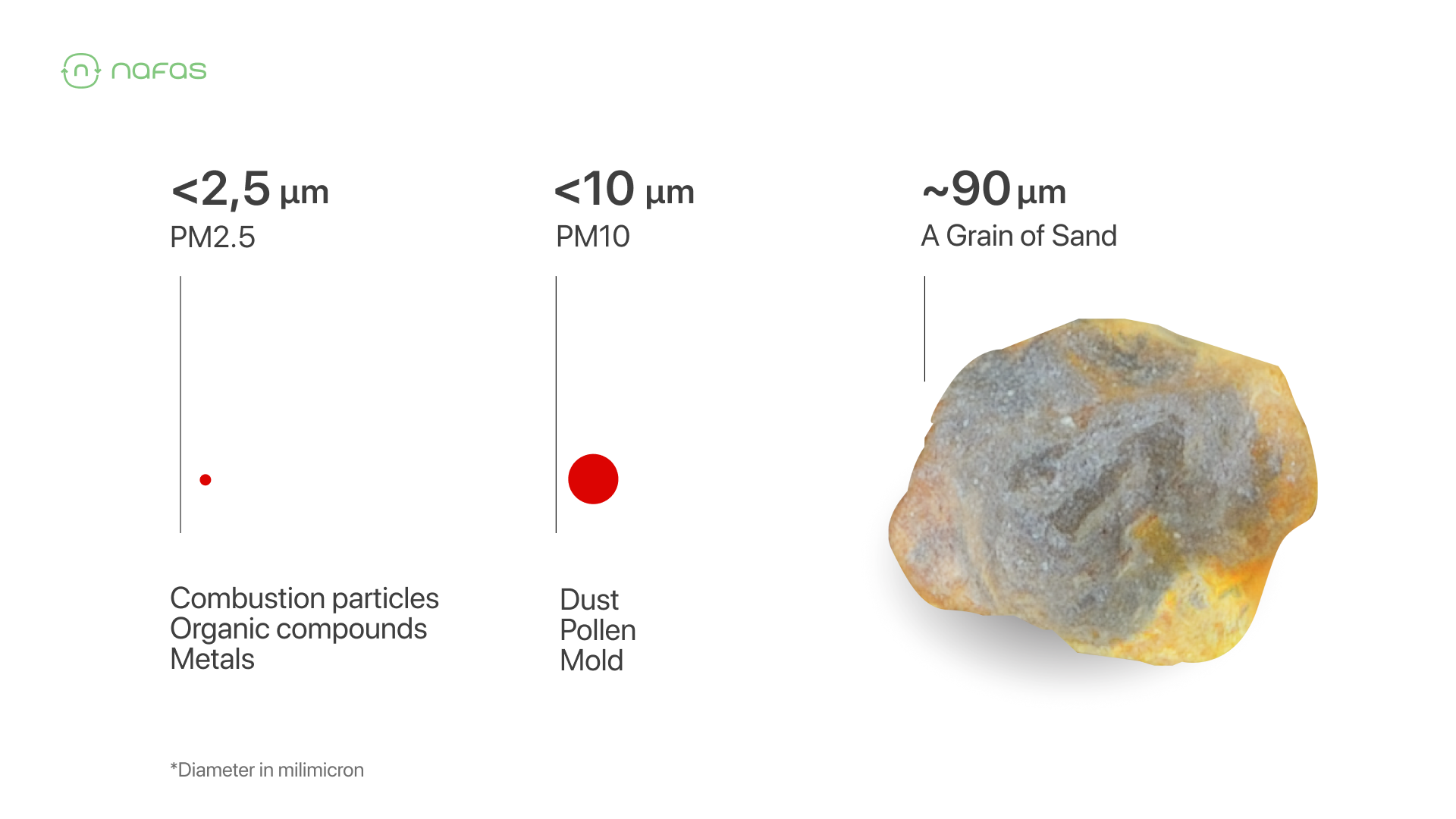
The Nafas team conducted field tests revealing that outdoor air pollution can infiltrate indoor spaces up to 100%. This poses a significant concern, particularly for residents in heavily polluted cities like Jakarta.
A recent article by Nafas titled "Our Buildings Make Us Sick" emphasizes that air pollution is not limited to outdoor environments but is a considerable indoor concern. In cities with high pollution levels, indoor air quality often mirrors outdoor conditions, indicating that pollutants from outside can enter buildings, contaminating the air we breathe. This phenomenon is observed across various structures, including homes, offices, schools, and even a health clinic or hospital.
The Impact of PM2.5 on Cognitive Function and Memory
Recent research, particularly led by Dr. Joseph Allen from the Harvard Healthy Buildings Institute at the T.H. Chan School of Public Health, has delved into the relationship between the built environment and human performance. The 2021 COGFx study, spanning countries like Mexico, India, Thailand, the US, the UK, and China, examined how indoor air quality influences the cognitive performance of office workers.
The study's findings, outlined in the COGFx study, revealed a concerning trend. When PM2.5 levels exceeded 12 µg/m3, there was a noticeable decline in performance across four out of five cognitive tasks among office workers.
Meanwhile, based on a study published in The International Journal of Building Science and Its Applications, investigates the impact of portable air purification on the cognitive performance of employees in an office in Beijing. In the intervention condition, purifiers controlled PM2.5 levels at breathing zones, while in the control condition, they were present but inactive. The PM2.5 levels averaged 18.0 μg/m³ in control and 3.7 μg/m³ in intervention. Cognitive tests conducted 5 to 7 hours after arrival showed significantly better performance in 9 out of 16 cognitive skills during the intervention, particularly in memory.
Responding to this critical concern, Nafas works together with Neuro Care Clinic to improve indoor air quality, aiming to create a healthy environment for patients and medical staff throughout operational hours.
Challenge: Poor Indoor Air Quality at Neuro Care Clinic
To evaluate the infiltration of outdoor air pollution into the indoor classrooms of the Neuro Care Clinic, Nafas deployed air quality monitors connected to a cloud-based system. These monitors tracked PM2.5 levels, CO2 concentration, temperature, and humidity.
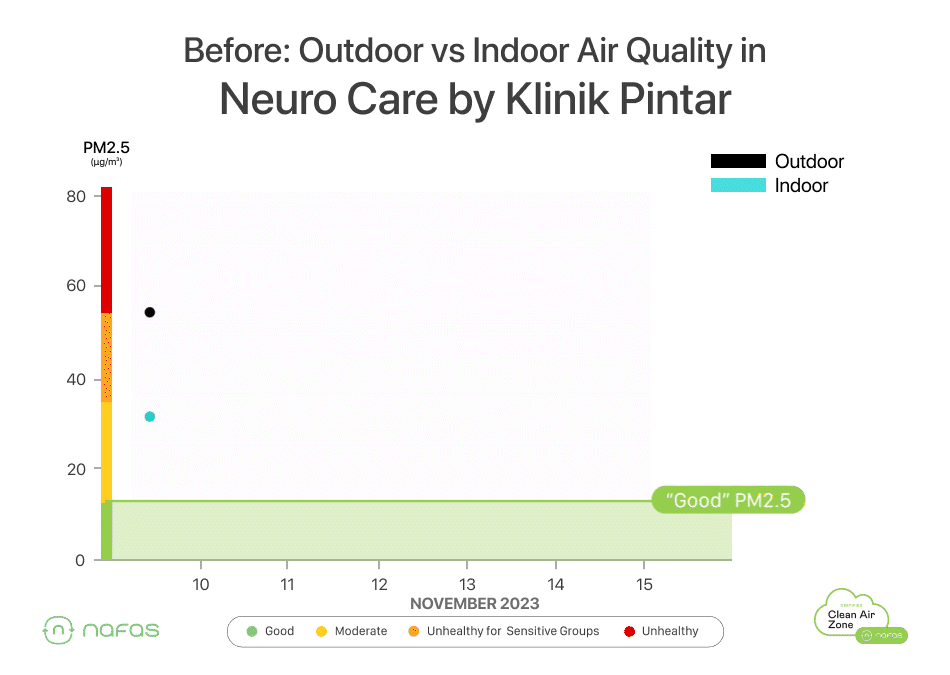
The diagnostic phase uncovered troubling results: the levels of indoor and outdoor air pollution were closely aligned. The data collected in November 2023 revealed consistently elevated pollution levels both indoors (depicted by the blue line) and outdoors (represented by the black line). Pollution levels consistently surpassed 15 µg/m³, exceeding the 'Good' air quality limit recommended by the study and WHO guidelines.
Field survey results showed a spike in PM2.5 pollution inside the clinic, reaching 45 µg/m³, exceeding 3 times the recommended limit, which is 15 µg/m³!
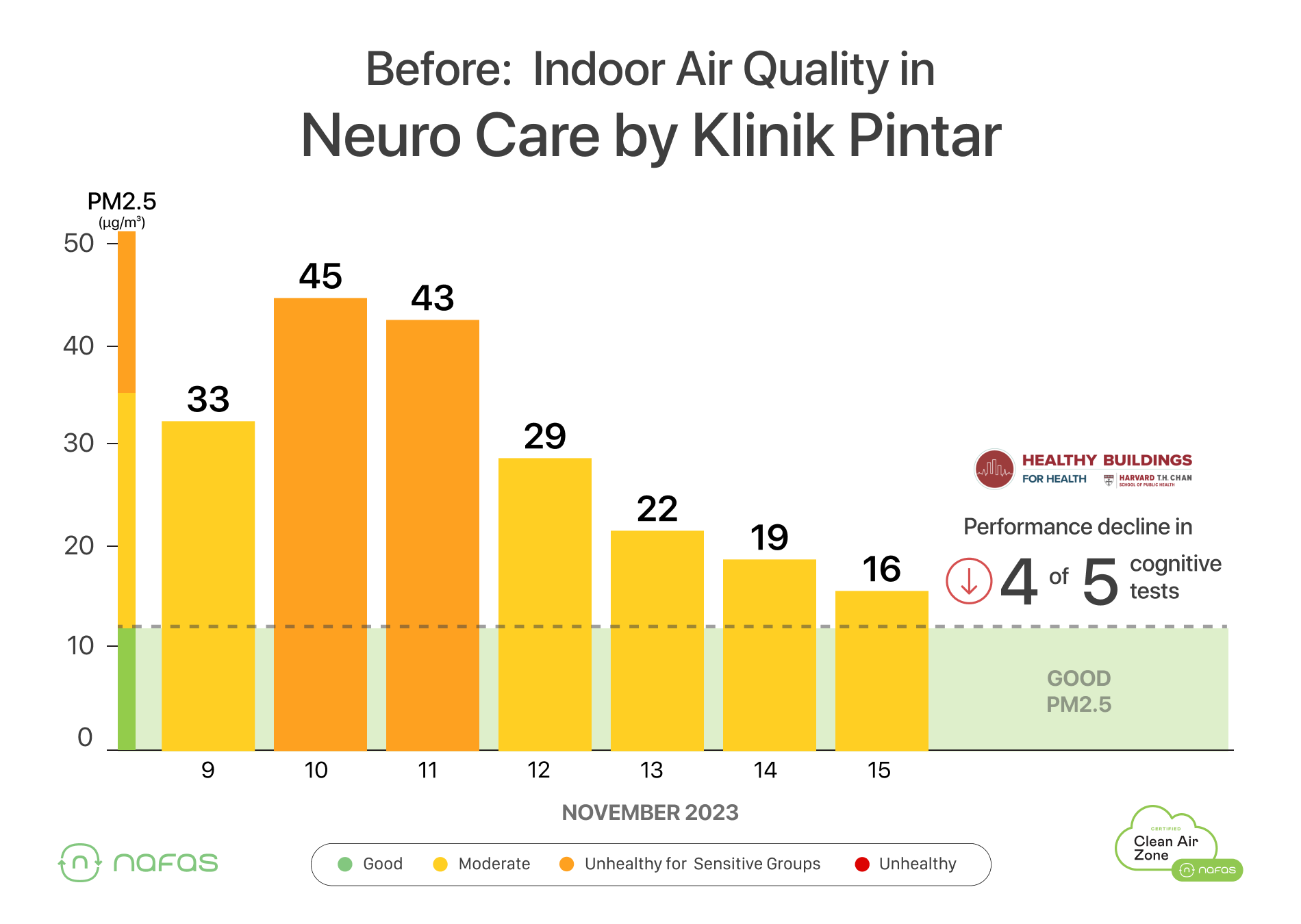
The existing building infrastructure could not filter outdoor pollutants, jeopardizing the well-being of everyone inside. This situation underscores the critical necessity of introducing air purifiers in clinics to establish a safe and healthy environment for all patients and medical staff.
Solution: Transforming Neuro Care Clinic into a Clean Air Zone
To address the challenge of poor indoor air quality at Neuro Care Clinic, Nafas introduced the Clean Air Zone system. This comprehensive ecosystem is specifically designed to uphold healthy indoor air quality consistently throughout operational hours. The approach involves an automated and integrated system, encompassing precise air quality measurements, efficient air filtration methods, rigorous certification standards, and data-driven initiatives that engage relevant stakeholders.
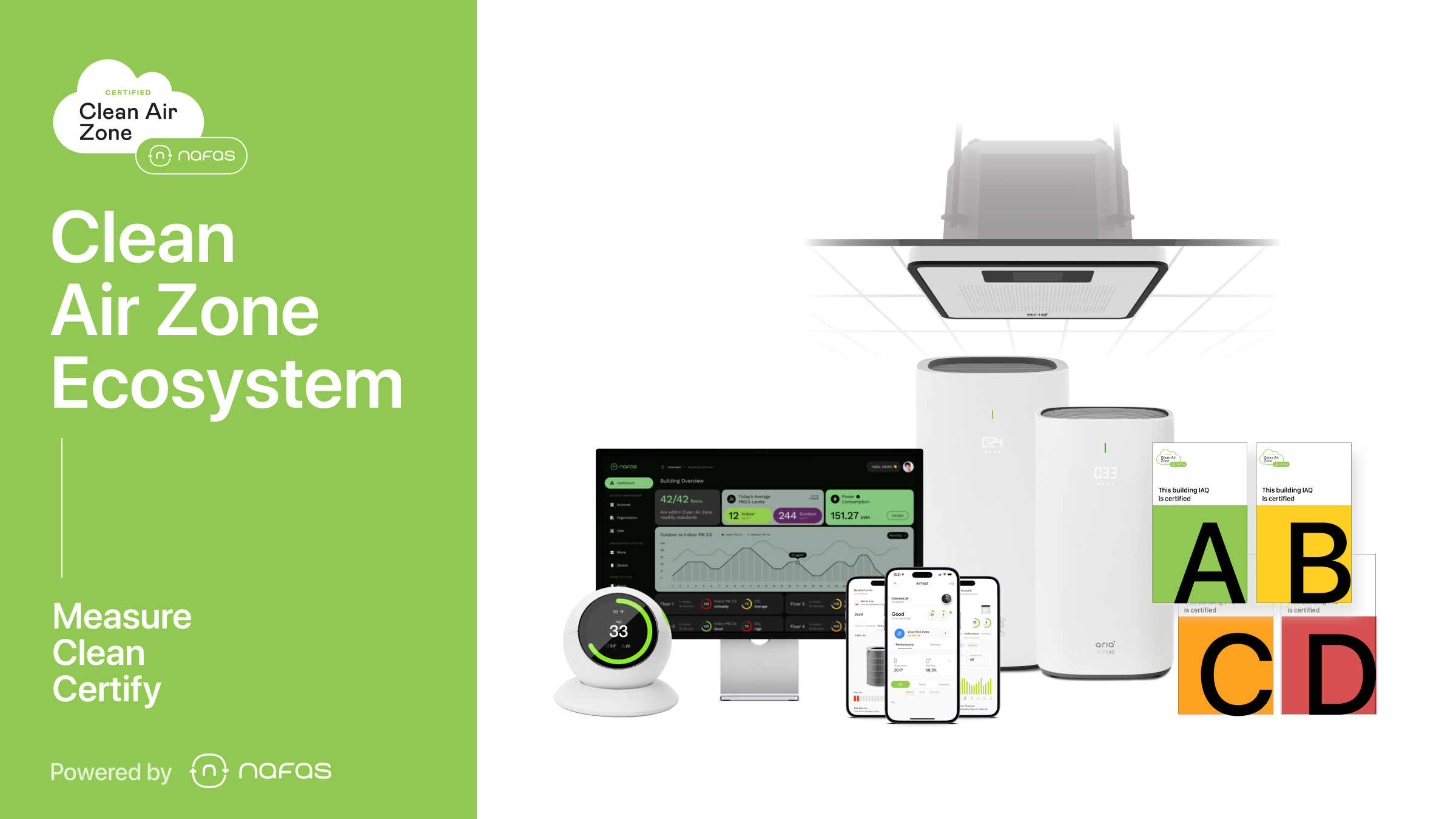
Our services are accessible through a subscription model, eliminating upfront investment. The Clean Air Zone ecosystem offers a convenient and effective solution to enhance indoor air quality, prioritizing the well-being of patients and medical staff.
Results: Significant Improvement in Air Quality at Neuro Care Clinic by Klinik Pintar
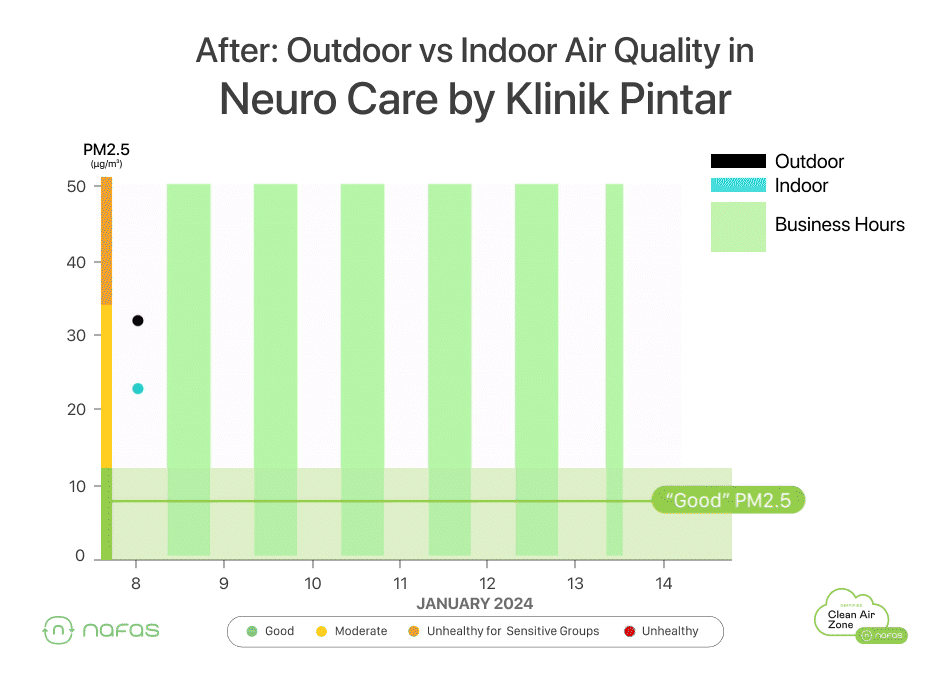
Neuro Care Clinic has officially become a Clean Air Zone. The collaboration between Nafas and Klinik Pintar emphasizes the importance of healthy air inside the clinic.
Data from January 2024 shows that the Clean Air Zone ecosystem has successfully maintained healthy air quality in Neuro Care Clinic during operational hours. This initiative has proven effective in mitigating health risks, cognitive performance, as well as productivity loss.
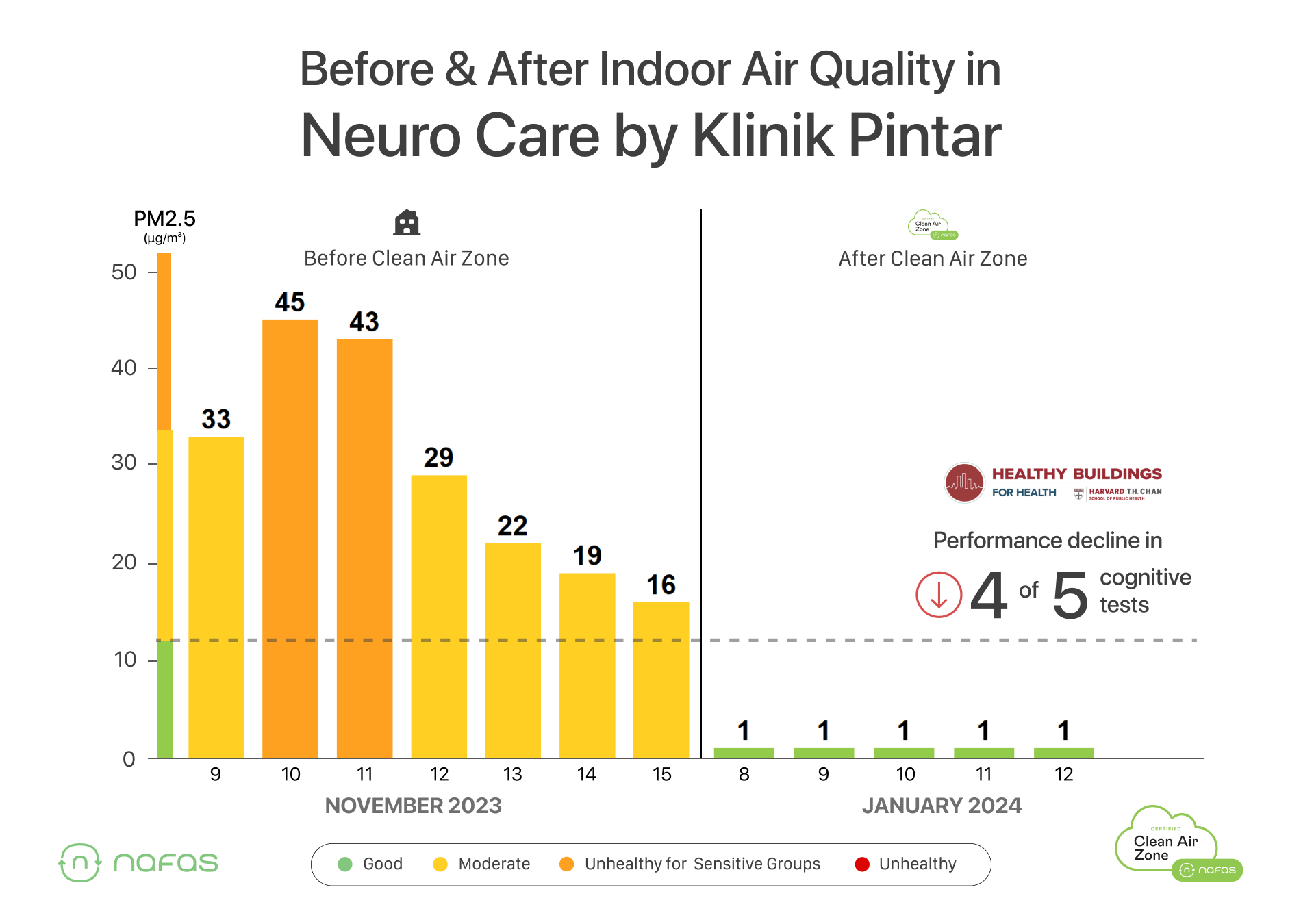
The results are striking: a 97.5% improvement in indoor air quality at Neuro Care Clinic since the implementation of Clean Air Zone. Now, everyone within the clinic consistently enjoys the benefits of breathing clean and healthy air throughout operational hours.
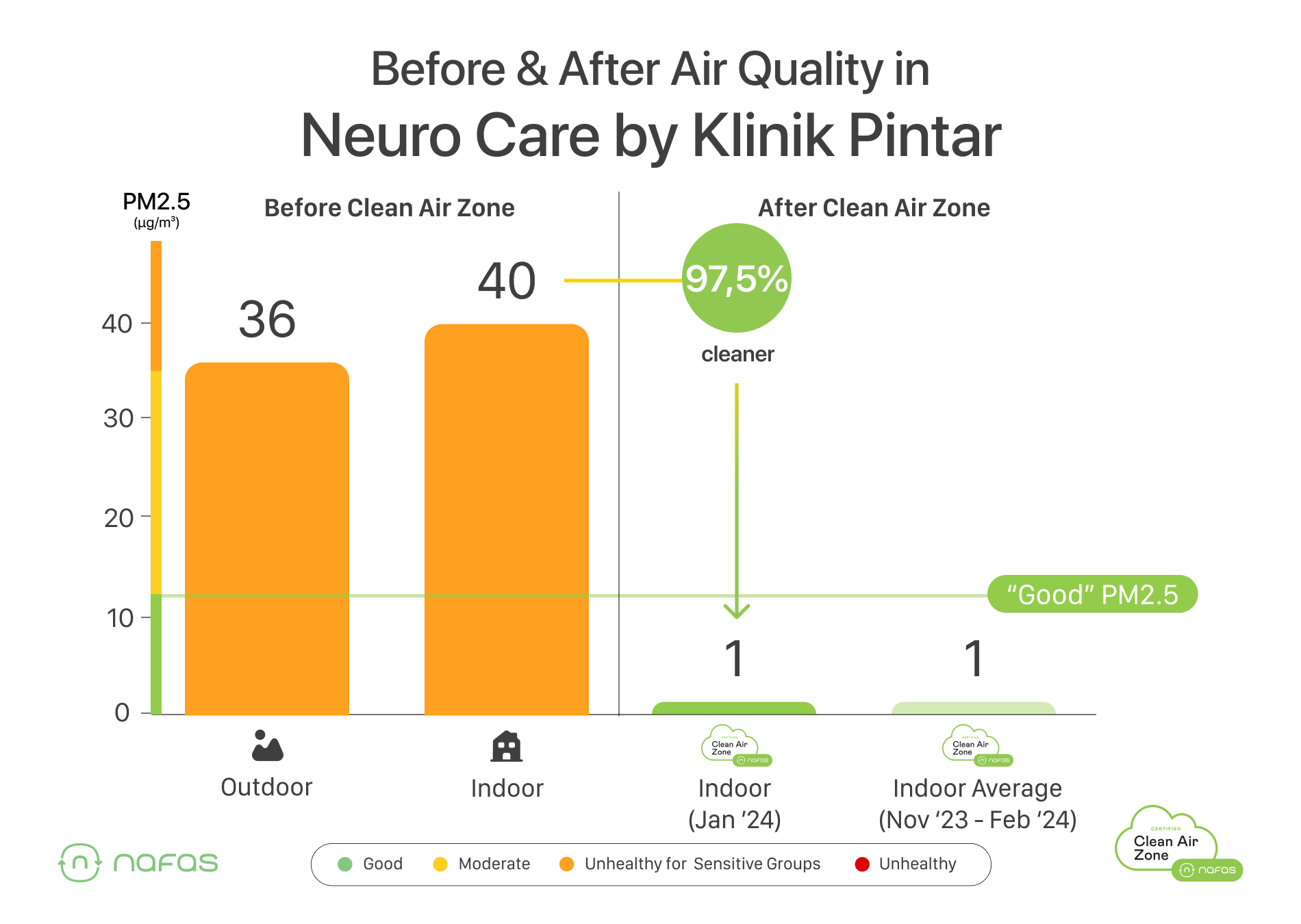
Monthly Air Quality Report
Through the data-driven Clean Air Zone service, Neuro Care Clinic by Klinik Pintar will receive monthly reports containing air quality metrics for the previous month. The school can share this information with parents, teachers, staff, and stakeholders at the school. Below is an illustration of the report that the school will receive every month:

Becoming a Clean Air Zone is Hassle-free
Keen on maintaining pristine air quality in your clinic? Don't hesitate to reach out to us at [email protected] or click the link below. Join us in our mission to establish clean air as the standard in our businesses!
